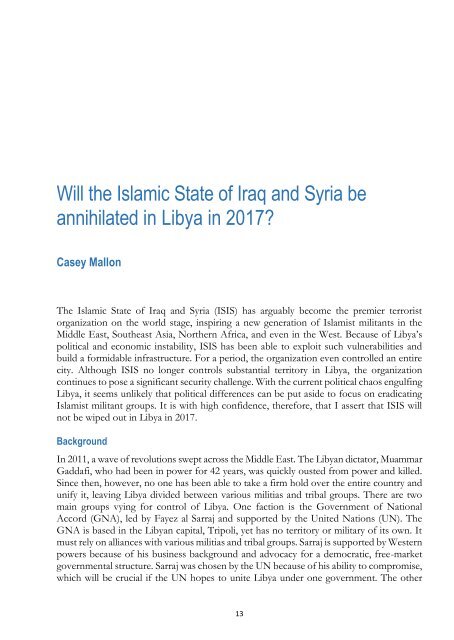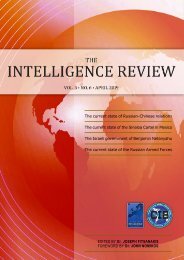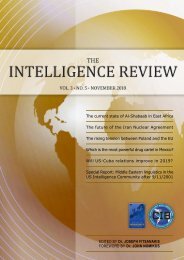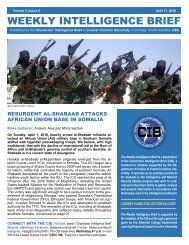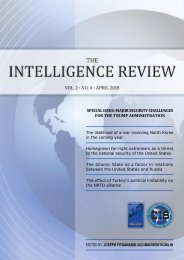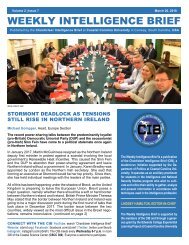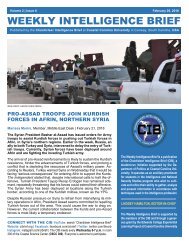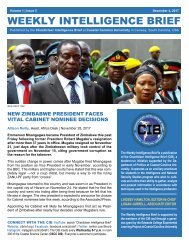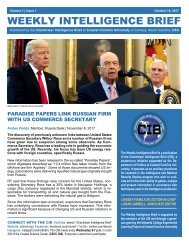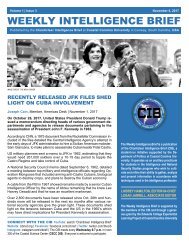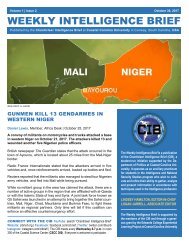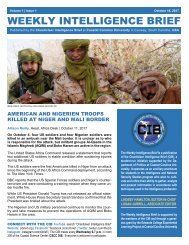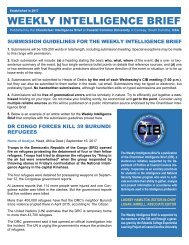The Intelligence Review | volume 2 | issue 3 |
This volume is the product of a collaboration between the European Intelligence Academy (EIA) and the Chanticleer Intelligence Brief (CIB), a student-run initiative supported by the Department of Politics at Coastal Carolina University in Conway, South Carolina, United States. Eight CIB analysts tackle some of the most pressing and timely questions confronting intelligence observers today. Topics in this volume include the current and projected strength of the Islamic State in Libya, the status of unification efforts on the island of Cyprus, the future of the government in Venezuela, and the United States’ place in the Paris climate agreement. There are also papers examining the construction of energy pipelines in Central Asia, as well as aspects of Iranian geopolitics in relation to the United States. Last, though certainly not least, we have included an estimative intelligence analysis of the first round of this year’s presidential elections in France. It refers to an event of global significance that has already taken place. However, it is included in this volume as an illustration of the power of intellectual accuracy and the ability of an intelligence analyst to achieve 100 percent accuracy —as this analyst does— by methodically considering and evaluating the analytical parameters of her question with the right balance of precision and intuition.
This volume is the product of a collaboration between the European Intelligence Academy (EIA) and the Chanticleer Intelligence Brief (CIB), a student-run initiative supported by the Department of Politics at Coastal Carolina University in Conway, South Carolina, United States. Eight CIB analysts tackle some of the most pressing and timely questions confronting intelligence observers today.
Topics in this volume include the current and projected strength of the Islamic State in Libya, the status of unification efforts on the island of Cyprus, the future of the government in Venezuela, and the United States’ place in the Paris climate agreement. There are also papers examining the construction of energy pipelines in Central Asia, as well as aspects of Iranian geopolitics in relation to the United States. Last, though certainly not least, we have included an estimative intelligence analysis of the first round of this year’s presidential elections in France. It refers to an event of global significance that has already taken place. However, it is included in this volume as an illustration of the power of intellectual accuracy and the ability of an intelligence analyst to achieve 100 percent accuracy —as this analyst does— by methodically considering and evaluating the analytical parameters of her question with the right balance of precision and intuition.
You also want an ePaper? Increase the reach of your titles
YUMPU automatically turns print PDFs into web optimized ePapers that Google loves.
Will the Islamic State of Iraq and Syria be<br />
annihilated in Libya in 2017?<br />
Casey Mallon<br />
<strong>The</strong> Islamic State of Iraq and Syria (ISIS) has arguably become the premier terrorist<br />
organization on the world stage, inspiring a new generation of Islamist militants in the<br />
Middle East, Southeast Asia, Northern Africa, and even in the West. Because of Libya’s<br />
political and economic instability, ISIS has been able to exploit such vulnerabilities and<br />
build a formidable infrastructure. For a period, the organization even controlled an entire<br />
city. Although ISIS no longer controls substantial territory in Libya, the organization<br />
continues to pose a significant security challenge. With the current political chaos engulfing<br />
Libya, it seems unlikely that political differences can be put aside to focus on eradicating<br />
Islamist militant groups. It is with high confidence, therefore, that I assert that ISIS will<br />
not be wiped out in Libya in 2017.<br />
Background<br />
In 2011, a wave of revolutions swept across the Middle East. <strong>The</strong> Libyan dictator, Muammar<br />
Gaddafi, who had been in power for 42 years, was quickly ousted from power and killed.<br />
Since then, however, no one has been able to take a firm hold over the entire country and<br />
unify it, leaving Libya divided between various militias and tribal groups. <strong>The</strong>re are two<br />
main groups vying for control of Libya. One faction is the Government of National<br />
Accord (GNA), led by Fayez al Sarraj and supported by the United Nations (UN). <strong>The</strong><br />
GNA is based in the Libyan capital, Tripoli, yet has no territory or military of its own. It<br />
must rely on alliances with various militias and tribal groups. Sarraj is supported by Western<br />
powers because of his business background and advocacy for a democratic, free-market<br />
governmental structure. Sarraj was chosen by the UN because of his ability to compromise,<br />
which will be crucial if the UN hopes to unite Libya under one government. <strong>The</strong> other<br />
13


